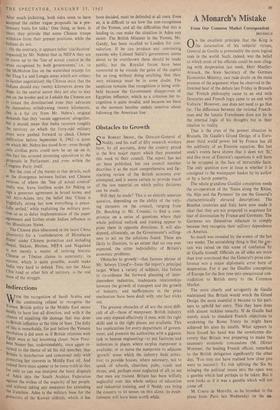Indirections
WITEI the recognition of Saudi Arabia and the continuing refusal to recognise the Yemen, British policy in the Middle East seems finally to have lost all direction, and with it the chance of repairing the damage that was done to British influence at the time of Suez. The folly of this is remarkable, for just before the Yemeni revolution it did seem as if British relations with Egypt were at last becoming closer. Now Presi- dent Nasser has, understandably, once again re- turned to the theme of all his old speeches, that Britain is treacherous and concerned only with protecting her interests in Middle East oil. And indeed there must appear to be some truth in this, for only so can one interpret the hasty dispatch of Aden into the South Arabian Federation against the wishes of the majority of her people. and without taking any measures for extending • the franchise. Aden is the military base for the Protectors of the Kuwait oilfields, which, it has been decided, must be defended at all costs. Even so, it is difficult to see how the non-recognition of the Yemen, and all the difficulties that this is leading to, can make the situation in Aden any easier. The British Minister in the Yemen, Mr. Gandy, has been recalled to London for con- sultation. If he can produce any convincing reasons why Colonel Sallal's government seems about to be overthrown these should be made public, but the Royalist forces have been rumoured to be outside the gates of the capital for so long without doing anything, that their very existence must be in some doubt. The suspicion remains that recognition is being with- held because the Government disapproves of Egyptian influence, which as a criterion for re- cognition is quite invalid, and because we have at the moment becoine unduly sensitive about following the American line.


































 Previous page
Previous page